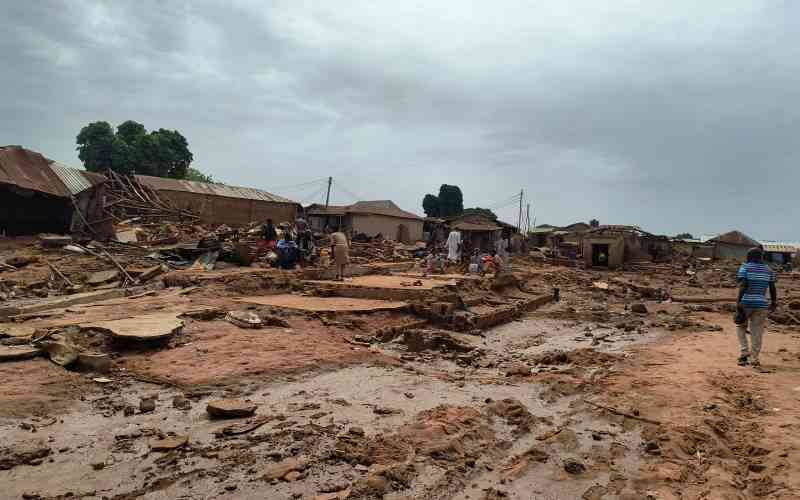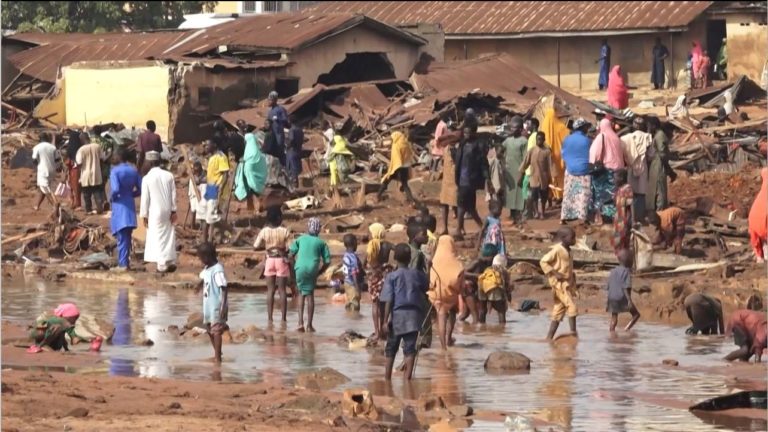Severe Flooding in Mokwa, Nigeria Claims Over 200 Lives

A catastrophic flash flood struck the town of Mokwa in north-central Nigeria during the overnight hours of Wednesday, May 28th, into Thursday, May 29th, 2025, resulting in a devastating loss of life and widespread destruction. Initial reports indicated that the torrential rains and subsequent flooding displaced more than 3,000 people and destroyed over 250 homes, leaving swathes of the town wiped out.
The official death toll quickly surpassed 200, as confirmed by Ahmad Suleiman, the Niger State Commissioner for Humanitarian Affairs, on Tuesday following the disaster. He stated that recovery efforts were ongoing, with teams "still looking for some corpses," and acknowledged that the exact number of casualties was difficult to ascertain. Some reports, including a statement from Niger State Deputy Governor Comrade Yakubu Garba, suggested that about 1,000 people were still unaccounted for. The scale of this single flooding event in Mokwa could potentially exceed the total number of flood-related deaths across Nigeria for the entirety of 2024, which stood at 321.
Eyewitness accounts and investigations pointed to a combination of factors leading to the disaster. Residents reported that water had been building up for days behind an abandoned railway track running along the edge of Mokwa. Normally, floodwaters would pass through culverts in the railway mounds, but debris had blocked these passages. This blockage caused water to accumulate until the clay walls of the embankment gave way, unleashing a torrent upon the unsuspecting town. Volunteers and disaster response teams later recovered bodies as far as 10 kilometres away, some having been swept into the Niger River.
While torrential rainfall was the immediate trigger, officials and experts highlighted underlying issues. The Federal Minister of Water Resources and Sanitation, Prof. Joseph Terlumun Utsev, affirmed that the flood was primarily caused by intense rainfall, the effects of climate change, and the obstruction of a natural waterway, an ephemeral tributary of the River Dingi, due to unregulated development. He explicitly dismissed speculations that the disaster was triggered by any failure or release of water from the nearby Kainji and Jebba dams, stating both were "safe and fully functional." Climate change has been cited as making weather patterns in Nigeria more extreme, and common issues like inadequate drainage, construction on waterways, and the dumping of waste in drains further exacerbated the situation in Mokwa.
Prior warnings had been issued. The Nigerian Meteorological Agency had cautioned about possible flash floods in 15 states, including Niger State, for the period covering the disaster. Furthermore, the 2025 Annual Flood Outlook (AFO), released in April, had identified Mokwa among 19 Local Government Areas in Niger State as a high-risk zone.
In response to the crisis, the Niger State Government, under Governor Umar Bago, activated an emergency response and directed the distribution of relief materials, including trailers of rice, to displaced victims housed in makeshift arrangements. The governor's wife also reportedly donated N50 million. The Federal Government, through Minister Utsev, extended condolences and deployed technical teams from the Nigeria Hydrological Services Agency (NIHSA), the Upper Niger River Basin Development Authority (UNRBDA), and the National Water Resources Institute (NWRI) to conduct a detailed assessment. Minister Utsev stressed the need for stakeholders to heed warnings like the AFO and reiterated calls for improved drainage infrastructure, relocation of vulnerable communities, enforcement of land-use regulations, and sustained public awareness campaigns. He described the increasing frequency and severity of flooding as a "developmental crisis."
Despite government efforts, some locals expressed dissatisfaction with the aid response. Community leader Sarkin Hausawa Tanko Bala claimed there was no proper camp for the displaced, stating, "They relocated one primary school where nobody is there... I did not see any camp." He indicated that victims were making their own food and staying with neighbours. Multiple families reported not receiving any assistance. The aftermath in Mokwa was grim, with a powerful stench reported by AFP reporters, attributed by residents to decaying corpses trapped under rubble. Personal tragedies were immense, with one resident, Adam Yusuf, recounting the loss of nine relatives, including his mother, sisters, and cousins, and expressing skepticism that heavy rainfall alone caused such devastation.
The search for the missing continues as authorities and communities grapple with the immense impact of the Mokwa flood. The disaster serves as a stark reminder of the compounded risks posed by extreme weather, climate change, and human factors in vulnerable regions.










